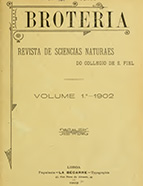

................................
Regarding the first point, it is notable that, as a cultural journal, Brotéria provided space for the dissemination of historiography and highlighted important publications in the field. This is evident in the "Bibliography” section, which pointed to relevant works, and in reviews of historical works or those directly related to it, such as Os Descobrimentos Portugueses [The Portuguese Discoveries] by Jaime Cortesão, Domingos Maurício, and Ensaios by António Sérgio and João Mendes. This presence of historiography resulted from the gradual broadening of the journal’s thematic scope, which predated the 1925 restructuring. The first issue of the "Cultural Series" continued a series of studies by Luís Gonzaga de Azevedo, grouped under the generic title of "Middle Ages", which appeared in the table of contents that year in the section entitled "The Middle Ages." In the section on "Sciences", "History" was separated from "Prehistory", which covered fields such as palaeontology and archaeology. Publications of this nature were characterised by a wide variety of themes. These ranged from the history of culture ( Verlaine e o Simbolismo em Portugal [Verlaine and Symbolism in Portugal]; A Reforma da Universidade e os seus Problemas [The Reform of the University and Its Issues]) to the history of music and art ( Música Contemporânea de Vanguarda e o Ideal de Cultura Universal [Contemporary Avant-Garde Music and the Ideal of Universal Culture]; Grão Vasco e os Pintores de Viseu [Grão Vasco and the Painters of Viseu]). Other topics included the history of science ( A Cultura Científica de Inácio Monteiro [The Scientific Culture of Inácio Monteiro]; Uma Academia Científica Luso-Espanhola, Antes da Expulsão dos Jesuítas [A Luso-Spanish Scientific Academy Before the Expulsion of the Jesuits]), economic history ( A Economia Portuguesa e a E.F.T.A. [The Portuguese Economy and E.F.T.A.]; Fundamentos e Objectivos da Política Industrial Portuguesa (1931-1986) [Fundamentals and Objectives of Portuguese Industrial Policy]), and political history ( A Política Externa Pombalina [Pombal’s Foreign Policy]; Discurso Historiográfico e Construção do Saber: O Topos «Decadência e Queda» do Império Romano na Historiografia Contemporânea [Historiographical Discourse and the Construction of Knowledge: The Topos "Decadence and Fall" of the Roman Empire in Contemporary Historiography]). Social history also featured prominently, with topics such as School of Knights: A Educação do Cavaleiro, Segundo o "Código das Sete Partidas" de Afonso X, o Sábio [The Education of the Knight According to the Code of the Seven Laws by Alfonso X, the Wise] and Cristãos na Luta de Classes [Christians in the Class Struggle]. Additionally, there was a particular focus on religious issues, explored in works such as História da Moderna Estética Religiosa [The History of Modern Religious Aesthetics] and Plano de Acção Pastoral do Patriarcado de Lisboa- 20 Anos Depois- Alguns Comentários de Natureza Histórica e Teológica [The Pastoral Action Plan of the Patriarchate of Lisbon– 20 Years Later: Some Historical and Theological Comments]. This thematic diversity reflects the wide-ranging contributions of authors from varied historiographical and geographical backgrounds, though the majority are Portuguese.
This work is financed by national funds through FCT - Foundation for Science and Technology, I.P, in the scope of the projects UIDB/04311/2020 and UIDP/04311/2020.
